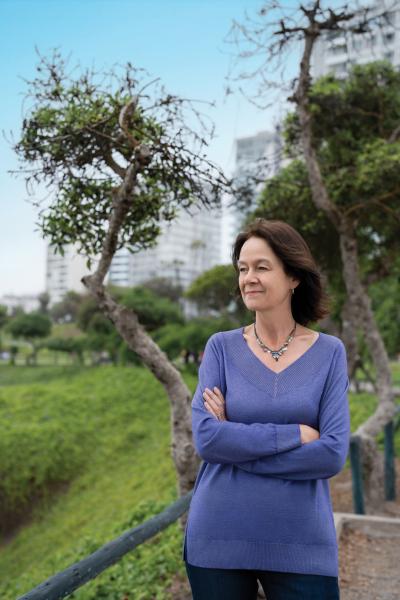
How Rotary set Sarah Laughton on her career path with the United Nations World Food Programme
By Sarah Laughton
Sarah Laughton is living in Peru, where she is a United Nations World Food Programme representative.
Image credit: Angela Ponce
This story begins with a Rotary Youth Exchange and ends with a Nobel Peace Prize. It’s a story, in other words, about how Rotary International helped one person to help others, and in so doing contributed to global goodwill and peace.
In 1988, Rotary District 709 — today it’s District 7090 — chose me as one of its exchange students. I still remember the thrill I felt when I learned that I, a high school student in St. Catharines, Ontario, would be traveling to Bogotá, Colombia. I spent a joyous year immersed in the language, culture, music, and food of that marvelous country, living with a host family that I am still close with more than 30 years later. Learning Spanish at that age equipped me for a volunteer job in Santiago, Chile, several years later, so I again lived in South America after my graduation from the University of Toronto.
The next gift Rotary gave me was a Rotary Foundation Ambassadorial Scholarship, enabling me to acquire a master’s in development studies from the London School of Economics and Political Science. “Enabling” is a key word in my story, because, starting with Colombia and continuing with the London School of Economics, Rotary made it possible for me to access a path that I might not otherwise have been able to travel.
It was the graduate degree earned from a prestigious school (that I could otherwise not have afforded), my fluency in Spanish, and my proven suitability for life abroad in foreign countries that convinced the United Nations World Food Programme to offer me a position in 1997 as a junior professional officer, or JPO, assigned to Sierra Leone. Canada and many other countries sponsor their residents for the UN JPO program, which is meant to encourage talented young professionals to pursue careers in sustainable development.
Sierra Leone is a beautiful country, but it was experiencing a terrible conflict — a civil war fueled by the trade in “blood diamonds” — during the three years I lived there. I had many experiences that 20-somethings from southern Ontario don’t usually have. More importantly, I began the process of learning about what humanitarian and development work involves.
Sarah Laughton
- Rotary Youth Exchange, 1988-89
- Bachelor’s in international relations, University of Toronto, 1994
- Rotary Foundation Ambassadorial Scholar, 1995-96
The UN World Food Programme is the world’s largest humanitarian organization working to reduce hunger and promote food security. It works in more than 120 countries and territories, providing lifesaving food in emergencies and helping individuals and communities find solutions to ensure that people get enough food. Until recently, the World Food Programme typically assisted up to 100 million people a year. But with the dramatic impact that COVID-19 had on hunger worldwide, the organization assisted more than 115 million people in 84 countries in 2020 and 128 million people in 2021.
My time in Sierra Leone was the beginning of a career with the World Food Programme that has spanned 25 years and led to multiple assignments around the world. In Sierra Leone and Liberia, I worked to provide relief to people displaced from their homes by conflict, while also supporting reconstruction of their communities. In Nepal, I managed a rural community infrastructure project that improved the livelihoods of people in some of the country’s remotest areas. In Eswatini (Swaziland when I visited), I coordinated the emergency response to a major drought and developed programs to support children left orphaned or vulnerable because of the devastating impact of HIV/AIDS. In Uganda, I worked to address child malnutrition and managed programs to support refugees, small-scale farms, and marginalized communities. I’ve had assignments in many other countries, such as Indonesia (after the 2004 tsunami), Jordan, Kenya, and Mauritania. This year, after spending more than six years at our headquarters in Rome — where I led a team charged with helping governments in developing countries strengthen their social-welfare systems — I began a new assignment as the World Food Programme’s representative to Peru.
The World Food Programme is a remarkable organization. To deliver food and other assistance to people who need it, the organization has 5,600 trucks, 30 ships, and nearly 100 planes — and in Nepal, we even used yaks! It also provides more than $2 billion a year in cash assistance for people to choose their own food locally.
Sarah Laughton’s 25-year career with the United Nations World Food Programme has included assignments in Nepal and Eswatini (the country formerly known as Swaziland).
Courtesy of Sarah Laughton
